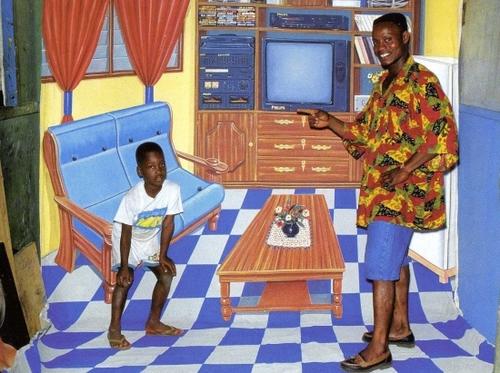Filmmaking and Research in Africa
Tobias Wendl hopes to break new ground in a newly endowed professorship.
Apr 23, 2010
The visual culture of Africa will be one of the priorities of new course offerings at the Art History Institute.
Image Credit: P.K. Apagya/No place like home 1996
Contemporary photography, first-run films, and video installations – those aren’t exactly the artifacts that spring immediately to mind when we think of African art. But to Tobias Wendl, they are just as much a part of the continent’s art history as its widely known masks and sculptures. His areas of focus include not only “old” and contemporary African art, but also visual culture in general. On March 1, 2010, Wendl was named the first holder of the Alfried Krupp von Bohlen und Halbach Endowed Chair for African Art at the Art History Institute.
The professorship was created at the initiative of the Alfried Krupp von Bohlen und Halbach Foundation. It provides funding and enables the holder to break new ground in an academic field that has not previously been represented in Germany.
And that, says Munich-born Wendl, is the challenge: “The nice thing about it is that we don’t have to deal with any inherited baggage. We can start everything from scratch.” Wendl is considered an authority on old African art and the present-day African art scene. In addition to his publications, his many art projects and exhibitions – “aesthetic by-products of my research,” as he calls them – have won international acclaim. Wendl has taught at the universities of Munich, Cologne, Frankfurt, and Bayreuth. In his most recent position, he headed up the Africa Center at the University of Bayreuth for eight years, making it an important center of German research on Africa.
Practical Application instead of Mere Theory
Originally, Wendl didn’t even plan on a university career. After graduating from secondary school, he wanted to go right to work, and found a job as an architectural photographer. But then academia began to call to him after all. In Munich, he studied ethnology, modern literature, psychology, and linguistics. He would actually have liked to become a freelance filmmaker. “But at some point, I realized that making films and doing research works much better together if you want to get by.”
One professor, later his dissertation advisor, sparked Wendl’s interest in Africa: “Very early on, I developed a passion that has continued unabated.” Wendl has now traveled regularly to Africa for 30 years. Initially, his travels took him primarily to West Africa, but with the end of apartheid, he shifted his focus to South Africa in the 1990s. To Wendl, the Cape is home to the continent’s most vibrant art scene.
Reaching the General Public
Wendl hopes to be able to share his knowledge not only with university institutions, but with the public at large, fostering international dialogue on African art – and, in his opinion, a picture is worth a thousand words in that regard: “Through my films and exhibitions, I became aware that there is a high level of interest in visual work and that you can also reach a broader audience.”
That is an experience he also hopes to pass along to his students. During his first semester at Freie Universität Berlin, the Art History Institute is holding an event on old African art and the history of how it has been received, a regional seminar on contemporary art in South Africa and one on the history and major movements in African cinema, and a research colloquium.
Casting a Modern Light on History
It is important to Wendl to ensure that the field is served by up-to-date equipment and facilities: At the Art History Institute, he aims to establish a specialized library that is competitive at the international level and an image database, with particular consideration given to media and video arts. He has plans for a media lab that will allow students to do their own work, hands on: “Students should get to know new formats of academic work so that they can enter their professional lives on a stronger footing right from the start.”
Further Information
Freie Universität Berlin, Art History Institute
Tel.: +49 (0)30 – 83 85 53 23
Email: tobias.wendl@fu-berlin.de

